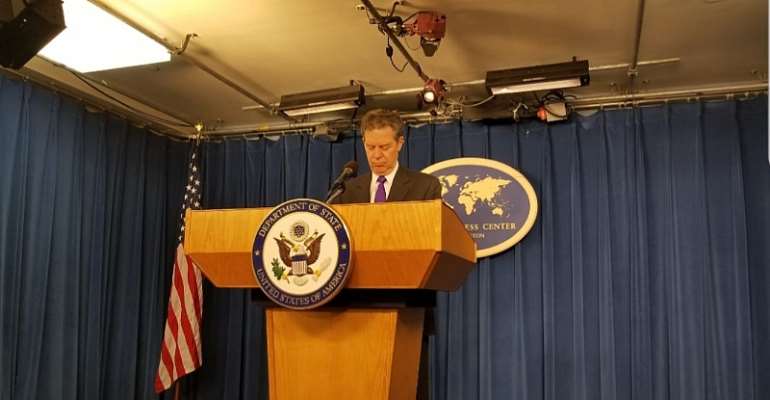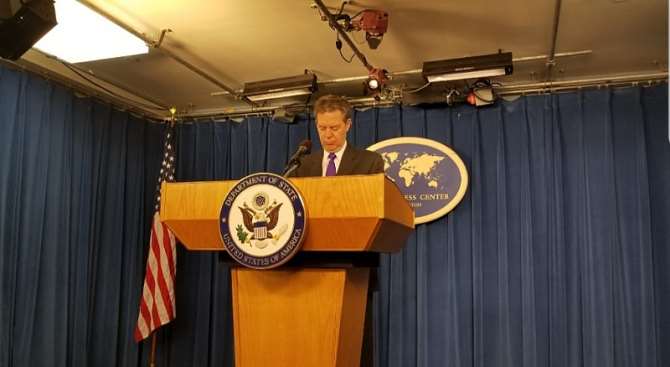US Govt Worried Over killings of Christians in Nigeria dispatches envoy to Meet Nigerian Officials

The United States on Tuesday again expressed worries over repeated killings of Christians in Nigeria, and would be sending one of its envoys next month to discuss ways to advance religious freedom in Africa’s most populous nation.
The U.S. government would also host in Washington DC between July 25 and July 26 foreign ministers and religious leaders from around the world to discuss religious freedom.
Ambassador-at-Large for International Religious Freedom, Samuel Brownback, announced at a press briefing in Washington D.C. on Tuesday that he would be traveling to Nigeria in June to discuss religious freedom with government officials and religious leaders.
He recalled that President Donald Trump had already expressed worries over the killings of Christians in Nigeria when he met with President Muhammadu Buhari at the White House on April 30.
Ambassador-at-Large for International Religious Freedom, Samuel Brownback, during a press briefing in Washington D.C. on Tuesday May 29, 2018, following the release of the International Religious Freedom Report 2017. Photo: Simon Ateba
“My plan is to travel to Nigeria next month to talk with leaders, government leaders, religious leaders, Christian and Muslim leaders, to talk about what we can do to move forward, to reduce the level of violence, to open the way for religious freedom taking place in that country,” said Brownback, a former member of Congress and a governor.
He said he met with three Christian leaders in Nigeria last week, and although they agreed things were slightly improving, he concluded that much progress needed to take place “for the government to secure the right of religious freedom”.
The press conference followed the release on Tuesday of the International Religious Freedom Report 2017.
He said the report shows some progress has been made but the situation remains dire in many countries around the globe, including in China, North Korea, Russia and Burma.
Below is an interaction between Today News Africa’s Simon Ateba and Ambassador Brownback on religious freedom in Nigeria.
QUESTION: Thank you. My name is Simon Ateba from Today News Africa. In the report, you talked about the religious freedom in Nigeria, and you said it continues to experience significant challenges. For instance, the leader of the Shiite movement, El-Zakzaky, remains in detention three years after he was arrested. What type of engagement do you have with the Nigerian Government in the light of all the challenges that they continue to experience in Nigeria? Thank you.
AMBASSADOR BROWNBACK: Yes, and thanks for mentioning that. As you know, President Trump met with the president of Nigeria within the past couple of weeks. And in their press avail afterwards, one of the first things the President cited was the persecution – the killing – of a number of Christians in Nigeria. And there’s a lot of violence that’s taking place in that country.
My plan is to travel to Nigeria next month to talk with leaders, government leaders, religious leaders, Christian and Muslim leaders, to talk about what we can do to move forward, to reduce the level of violence, to open the way for religious freedom taking place in that country. And I’ve been meeting with a number of different Nigerian leaders, and it’s been a very difficult – I met with three leaders, Christian leaders, last week. And they said to me they used to – Sunday used to be the day they hated to see coming the most, because that’s when most of the attacks would take place, would be on a Sunday, but that it had gotten better in recent times, and they were appreciative of that. But just much progress needs to take place for the government to secure the right of religious freedom.
And remember, our effort is for religious freedom for everybody, regardless of faith, or even if you’re a person without faith, but that you are free to do with your own conscience whatever you choose and that no government has the right to interfere with that. But the government has the right and the responsibility to protect that religious freedom right, and that’s what we’d be pushing with Nigeria.
-Today News Africa’s-

